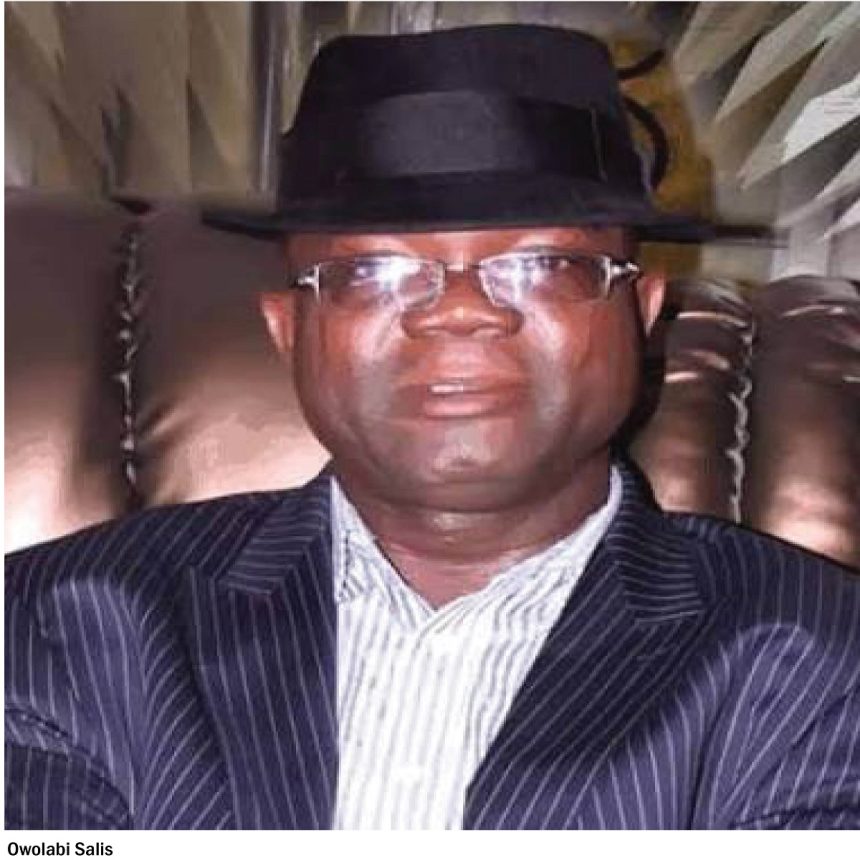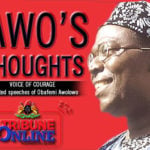Owolabi Salis, a legal luminary, accountant, astronaut and politician, opened up on his life story in this interview with SEGUN KASALI.
I learnt you grew up in Fadeyi Area of Lagos, during the Civil War. What was the experience like growing up in such a highly volatile part of Lagos, during that period?
Yes. I grew up in Fadeyi area during the Civil War. I was very young at that time. We had people from the South-South and the South-East around and efforts were made to ensure they were protected by the federal troops, at that time. Some other memorable things were those things we did within the neighbourhood. In the 60’s and early 70’s, we used to live together. Communal living was very strong. A child didn’t have to be yours in order to discipline him or her. There were so many brilliant guys out there, but all I remember is that I went to Catholic School and in the evening, I would go to Islamic School. I went to St. Patrick in Yaba. In those days, most people combined that and they never cared. We were always looking forward to Ileya/Christmas festivals irrespective of your religious belief. We would all pack ourselves inside my guardian’s vehicle, then, to attend those festivals. In the 60’s and early 70’s, we would take rams to go and fight. But, unfortunately, I lost my dad when I was young. I practically grew up with my aunt.
And how would you describe your aunt, a disciplinarian?
Growing up in those days, like I said, you didn’t have to be the child of someone before you were called to order; it was a form of co-parenting. Cross-discipline was highly practised then and there was no discrimination. We would all gather ourselves by the window to watch television. It was a communal living and that was why the young ones, then, hardly went astray.
Were there some nicknames with which you were identified, then?
I didn’t really have a nickname other than the fact that every Owolabi was called Owoblow. And I remember many things crossed my mind as at that time. Sometimes, you wanted to be a musician and, at times, a pilot. But, when I was in secondary school, I was good in Mathematics. I can confirm to you I had A1 in Mathematics and same in Physics, Chemistry and Biology. Unfortunately, I did not pay attention to English. I was supposed to be a medical doctor, but had a change of mind. I remember myself and a host of others would go to Yabatech and University of Lagos to read overnight. I remember I gained admission to University of Ife to read Accounting. But at the time, I had already gotten admission to study at Ahmadu Bello University (ABU). I later proceeded to the University of Lagos for my Master’s education. My schoolmates were the former Gombe State governor, Dakwambo and the current Attorney General of Lagos State, Lawal Pedro.
You must have been one of the gurus of Accounting while in school?
Of course, I was top of my class. My 2:1 was a little below First Class. Interestingly, it was one of my classmates, from Lagos, who was half-blind, who bagged a First Class.
Were you into activism at ABU, since the university, then, was seen as one of the hotbeds of activism, then?
Yes. You are absolutely correct. I contested for the position of Secretary-General of the Students’ Union. I was very active and did a lot of research on democracy because of the diversity I saw at the university. If you were in Kongo Campus, then you would see different ethnic groups and how they were living peacefully.
How was life immediately after ABU?
It came with a lot of pressure, but I became a Chartered Accountant. I remember rescuing Institute of Chartered Accountants of Nigeria (ICAN) from running into bankruptcy back then. There was a lot of problems around 1989/1990. So, I had to run a lot of programmes for them, with which they raised a lot of money. I also got paid. In fact, you won’t believe I have forgotten some of the jobs I did for them. It is even good this question is being asked now. I remember I was in charge of the training on Value Added Tax (VAT) in the country. I was also the guest speaker for the 25th and 30th Conferences of the institute.
You don two professional caps: Accountancy and Law. How did you juggle the two without one disrupting the other?
Law actually takes over Accounting. You know, Accounting is much more structured. If you are radical with Law, it will be a different ball game. It was well-balanced. I set up a Consultancy firm and also a law firm on Isaac John Street in Fadeyi, Lagos.
How would you describe your foray into politics?
I was in the opposition during Abacha regime. Baba Bush was one of our leaders then. I am a real underground NADECO man but you won’t know.
Why did you relocate from Nigeria to New York?
I came to New York in 1997. Prior to that year, I had been here in 1991. I entered the New York the last day my visa was to expire. Then, it was your entry that mattered and I was received by a Rights Group called African Fund and they linked me up with Jumoke Ogunkeyede. That is the guy, I know for sure, who is the real NADECO guy abroad. I don’t know why President Tinubu has yet to honour the guy. When I came and saw what he was doing, I had to lend my support. General Alani Akinrinade, Professor Wole Soyinka, Hafsat Abiola, Walter Carrington and a host of others came to New York to testify and the guy called Jumoke coordinated everything. They even burnt down his house. So, when I came to New York, it was a lot of battles. It took a while before my request was granted. Anyone that comes here has to put his head on the subway. You have to first sort out your accommodation and I had to convert all my degrees to American degrees. So, I wrote ACCA exams and I passed. I wrote the New York Bar exams which I also passed. I remember after my six months, I bought one car called Chrysler for $160 at an auction. I did taxi driving which made us to understand and know a lot of places. Thereafter, I started a Law firm which was opposite Federal Reserve Bank.
When was the breakthrough?
I was supposed to go into investment practice but It was too slow, not because I was not good but because nobody trusted you. But, there was this lady who had been in the courtroom for more than 15 years. She told me about her immigration challenge. I did a research on it and it worked out well for her and suddenly, her claim was approved after 15 years.
There was another case, which was a federal lawsuit in California. But, not so many lawyers were aware about it, but luckily, I was. I read it because the government published something about it online and people started buying into it. But, I did not take money from people for it. One day, the government just brought like 500 approvals after they had delayed for almost six months without any response while we kept on sending applications. There was no lawyer fee attached to it but people later paid after it was approved. As a result, there was a huge crowd in front of my office on Maiden Lane in New York that it became too much. They had to kick me out of that office because of the crowd. When other lawyers told them they could take up the same case for them, the people said no. So, when they kicked me out, I went to 42 Broadway. They did not really kick me out. I was just too big for that place. Then, I had this magazine supporting immigrants’ causes.
What would you love to be remembered for?
You know I am an astronaut? So, my going to space was for the purpose of research. I did a lot of research on diversity problems such as: Why are people fighting, and all that? I know that there are two major reasons why people are killing themselves. One is race, particularly in terms of the differences in colour. The second is religion. We should not be fighting if we know who the Almighty Lord is. Anyway, I want to be remembered as the man who touched so many lives.
WATCH TOP VIDEOS FROM NIGERIAN TRIBUNE TV
- Relationship Hangout: Public vs Private Proposals – Which Truly Wins in Love?
- “No” Is a Complete Sentence: Why You Should Stop Feeling Guilty
- Relationship Hangout: Friendship Talk 2025 – How to Be a Good Friend & Big Questions on Friendship
- Police Overpower Armed Robbers in Ibadan After Fierce Struggle






